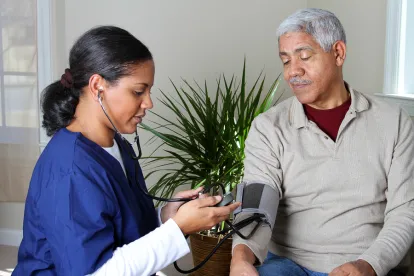In the face of the novel Coronavirus Disease 2019 (COVID-19) public health crisis and national emergency, healthcare providers all around the country are scrambling to identify their legal obligations pertaining to patient and staff notifications of possible or known exposure to COVID-19, as well as the current state of government directives applicable to them. Below is a summary of some key legal provisions and government directives in the State of Arizona. Please note, governmental responses to COVID-19 continue to evolve so the information outlined below is subject to change.
Criminal Prohibitions Relevant to the COVID-19 Emergency
-
A person who knowingly exposes him or herself or another afflicted with a contagious or infectious disease in a public place or thoroughfare, except in the necessary removal of such person in a manner least dangerous to the public health, is guilty of a class 2 misdemeanor. A.R.S. § 36-631.
State Reporting Requirements for Health Care Providers
-
A person who learns that a contagious, epidemic, or infectious disease exists must immediately make a written report to the state health department. The report must include names and residences of persons afflicted with the disease. If the person reporting is the attending physician, he or she must report on the condition of the person afflicted and the status of the disease at least twice each week. A.R.S. § 36-621. Violation of this statute is a class 3 misdemeanor. A.R.S. § 36-630.
-
A person who knowingly secretes himself or others known to have a contagious or infectious disease is guilty of a class 3 misdemeanor. A.R.S. § 36-630.
-
Physicians must report in writing to the health department any death of a patient from contagious, infectious, or epidemic diseases. The report must be made within 24 hours of the patient’s death and must include the specific name and character of the disease. A.R.S. § 36-623.
Confidentiality of Communicable Disease Related Information
Arizona law provides for strict protections for patient privacy relating to communicable disease related information. Information pertaining to COVID-19 may fall within the statutory definition of “communicable disease related information.” These privacy protections are designed to shield information relating to a “protected person” and a “protected person” under the statute means a person who has been diagnosed as having a communicable disease. It is not clear how or if the limited availability of COVID-19 test kits will impact the interpretation of the scope of the statute. Disclosure restrictions for communicable disease-related information apply to:
-
any person who obtains communicable disease related information in the course of providing a health service;
-
any person who obtains communicable disease related information from a health care provider pursuant to an authorization; and
-
any person to whom communicable disease related information is disclosed pursuant to Arizona statutes governing permitted disclosures.
Unless an exception applies, Arizona law prohibits any disclosure (including compelled disclosures) of communicable disease-related information obtained in the course of providing a health service or obtained from a health care provider pursuant to an authorization. The same restrictions on disclosure also apply to any person (recipient) to whom communicable disease-related information is disclosed pursuant to a disclosure authorized by an exception.
Below is a non-exhaustive list of possible exceptions to patient confidentiality laws. Exceptions include disclosures:
-
authorized or mandated by state or federal law (including by HIPAA and regulations thereunder).
-
by the protected person or the protected person’s health care decision maker.
-
to a health care provider or first responder who has had an occupational significant exposure risk (as defined by statute) to the protected person's blood or bodily fluid and the health care provider or first responder has provided a written request documenting his or her occupational significant exposure risk. The written request must be reviewed and confirmed by a health care provider who is licensed by the Arizona Board of Osteopathic Examiners, the Arizona Medical Board, or the Arizona Board of Nursing and who is competent to determine a significant exposure risk. A health care provider who releases communicable disease information pursuant to such a request must also provide education and counseling to the person who has had the occupational significant exposure risk.
-
to an agent or employee of a health facility or health care provider to provide health services to the protected person or the protected person's child or for billing or reimbursement for health services.
In the context of the COVID-19, the above listed exceptions may be relevant for a person who obtained the information in the course of providing health services or by a person who obtained the information from a health care provider pursuant to an authorization.
Governor Ducey’s Emergency Declaration and Executive Order
On March 11, 2020, Governor Ducey issued a Declaration of Public Health Emergency to address the 2019 novel coronavirus. On the same day, the governor issued an Executive Order, which included the following directives to the Arizona Department of Human Services (ADHS):
-
To issue emergency rules for skilled nursing facilities, intermediate care facilities, and assisted living facilities to implement visitor policies designed to prevent the spread of COVID-19, which must include:
|
— |
|
policies to require screening and triage before entry by staff, visitors, vendors, and contractors; |
|
— |
|
establishing disinfectant schedules for frequently touched surfaces; and |
|
— |
|
establishing policies of distancing patients who exhibit symptoms of COVID-19 from other patients in common areas. |
-
In cooperation with the Department of Insurance, to require that all insurers regulated by the state of Arizona cover COVID-19 diagnostic testing from all qualified laboratories without regard to whether the laboratory is in-network.
-
In cooperation with the Department of Insurance, to require that all insurers regulated by the state of Arizona waive all cost-sharing requirements for consumers related to COVID-19 diagnostic testing.
-
In cooperation with the Department of Insurance, to require that all insurers regulated by the State of Arizona cover telemedicine visits at a lower cost-sharing point for consumers than the same in-office service to encourage utilization of telemedicine for the duration of the state’s public health emergency.
-
With all Arizona health regulatory boards, to prohibit, investigate, and take action against any licensed health professional or healthcare institution that engages in price gouging in relation to COVID-19 diagnosis and treatment-related services. In this context, price gouging is defined as the provider or institution charging a grossly higher price than that which was charged before the onset of the emergency.
Standing Order for COVID-19 Testing
On March 16, 2020, the ADHS issued a Standing Order for COVID-19 Testing Units, which authorizes any medical provider or trained personnel at a medically supervised COVID-19 testing unit in Arizona to collect and send a SARS-CoV-2 RT-PCR test for any individual who meets the patient eligibility criteria enumerated in the order. The Order also describes the procedure for collection of a nasopharyngeal swab, processing of the clinical specimen, and reporting of results to the patient and ADHS.
ADHS Guidance to Providers and Facilities
On March 17, 2020, ADHS issued written guidance to long term care facilities. An Emergency Rule (R9-10-121) governing Disease Prevention and Control in long term care facilities was approved by ADHS to be effective March 16, 2020 and was published by the Arizona Secretary of State on March 20, 2020. ADHS has also issued personal protective equipment guidance for providers and facilities, and has aggregated and organized recommendations to health facilities, health providers, and health plans at its website for COVID-19 response.




 />i
/>i

